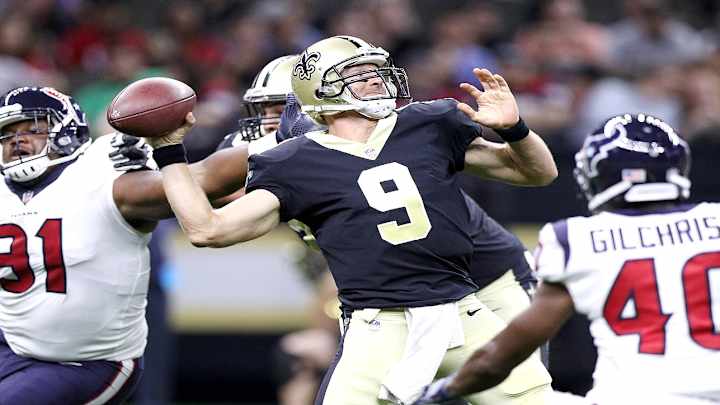Strategy and Advice for Picking a DFS Quarterback

It’s DFS Week at SI.com. All week, we and our 4for4 colleagues will help provide you with a foundation for DFS success this season. In this installment, 4for4’s Chris Raybon gives you his best practices for picking a quarterback in DFS contests.
The popularity of the NFL quarterback can give you a false sense of security in DFS. You know these guys. There won’t end up being some must-own guy you never heard of that only the sharpest DFS players used. But to be good at picking QBs, there are a few nuances you have to understand.
Below are five key tips for picking a QB in DFS that you should know before you submit your next lineup.
1. Target efficient Quarterbacks and don’t worry about volume
The more opportunities a player gets to score fantasy points, the more he will score. Seems logical, right? Turns out, that’s true for every position but quarterback.
It comes down to the way DFS sites award fantasy points. To score a touchdown’s worth of fantasy points with yards alone, a passer needs 100 yards but a rusher/receiver needs only 60. On top of that, the receiver, but not the passer, gets points for a completed pass. This creates a situation where it’s TD or bust for quarterbacks. And the passers who throw the most touchdowns tend to also gain the most yards per attempt. Picking a DFS quarterback is all about efficiency.
For example, the league leaders in pass attempts in 2016 were Drew Brees (673) and Joe Flacco (672). But while Brees finished as the fantasy QB3, Flacco eked out only a QB20 finish. How? Brees was a lot more efficient, piling up 891 more yards and 17 more TDs than Flacco.
2. Target Quarterbacks on teams with favorable betting odds
The average NFL team puts up two-thirds of its yardage and touchdowns through the air. And, of course, yardage and touchdowns lead to fantasy points. Thus, a quarterback’s production tends to be in line with how many points his team scores.
You can use the betting odds to calculate a projected point total for any team in a given game. For the underdog's points, subtract the game's spread from its over/under and divide by two. Then add back spread for the favorite's points. These implied team totals have a direct correlation to QB fantasy points.
An implied team total of 26+ is ideal and anything less than 22 is the opposite. This means, of course, that you want to target quarterbacks on teams that are favorites most of the time. Essentially, implied points help point out whether a defense is bad enough to target at the quarterback spot.
3. Target Quarterbacks at home
The league-average passer will put up better numbers at home than on the road. Home-road splits are especially important with expensive signal callers. While you would expect top quarterbacks to play well everywhere, most perform worse on the road. Since salary reflects total performance, you may not get what you pay for with an expensive passer on the road. For example, since 2014 Ben Roethlisberger averages 70 yards and 1.8 TDs per game fewer on the road than he does at Heinz Field. On the road over that same span, Drew Brees averages 37 fewer yards and 0.5 fewer touchdowns, while Aaron Rodgers is down 27 yards and 0.8 touchdowns per game.
2017 Fantasy Football Quarterbacks: Will Russell Wilson's value increase in 2017?
4. Use the cheapest playable Quarterback as a starting point
Since they get fewer points for yards and TDs, quarterbacks have a smaller range of outcomes than other positions. Thus, it's better to focus on locking in predictable players at the other positions first. There will be a lot of options at quarterback in a given week, so use the cheapest playable one as a starting point.
5. Go against the grain in tournaments
To finish atop a tournament leaderboard, your lineup needs differentiation somewhere. With an excess of options to fill one slot, quarterback is perfect to choose someone you think won’t be too popular. QBs average the lowest ownership in first-place DraftKings Millionaire Maker lineups. Same thing for the FanDuel Sunday Million.
